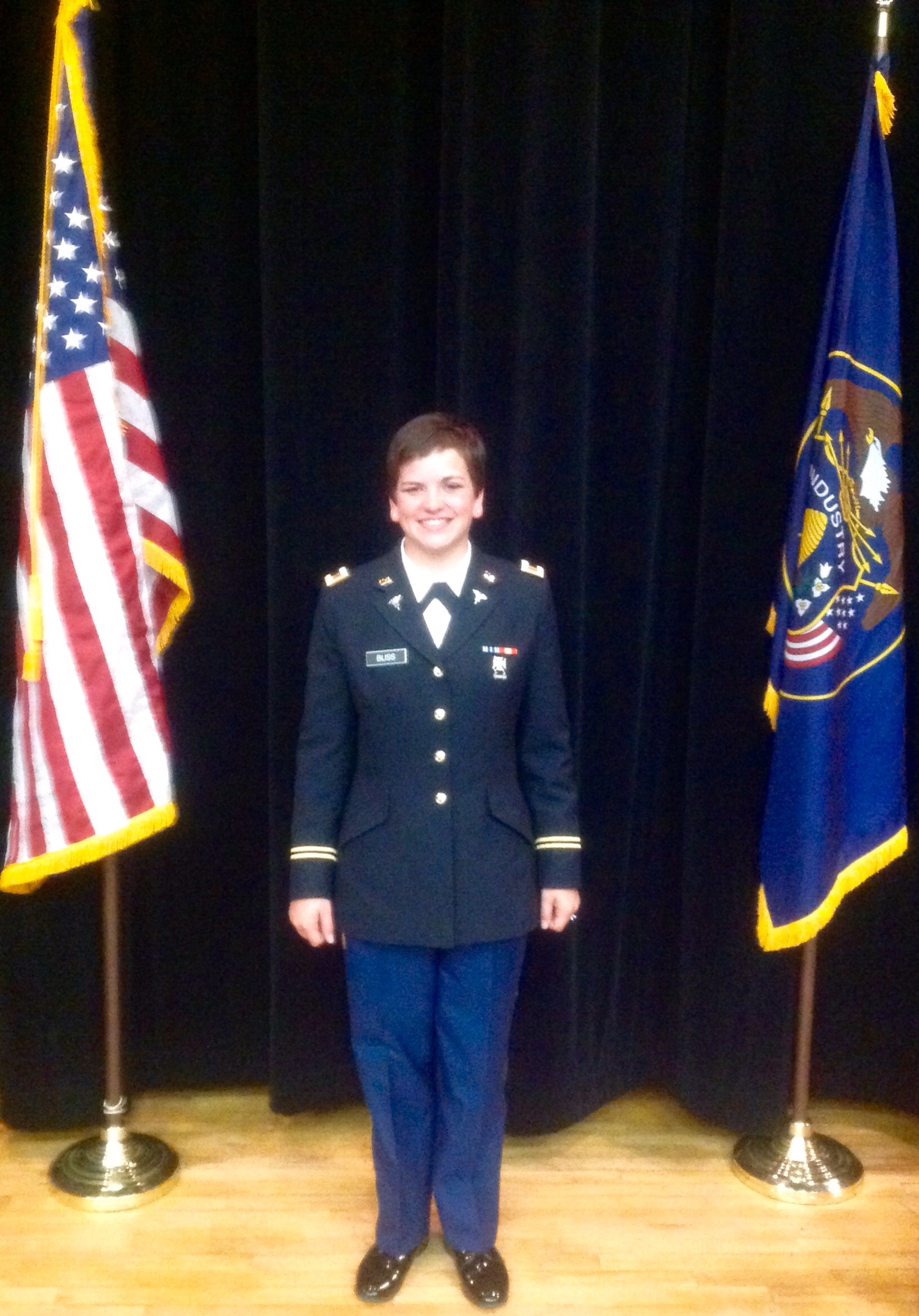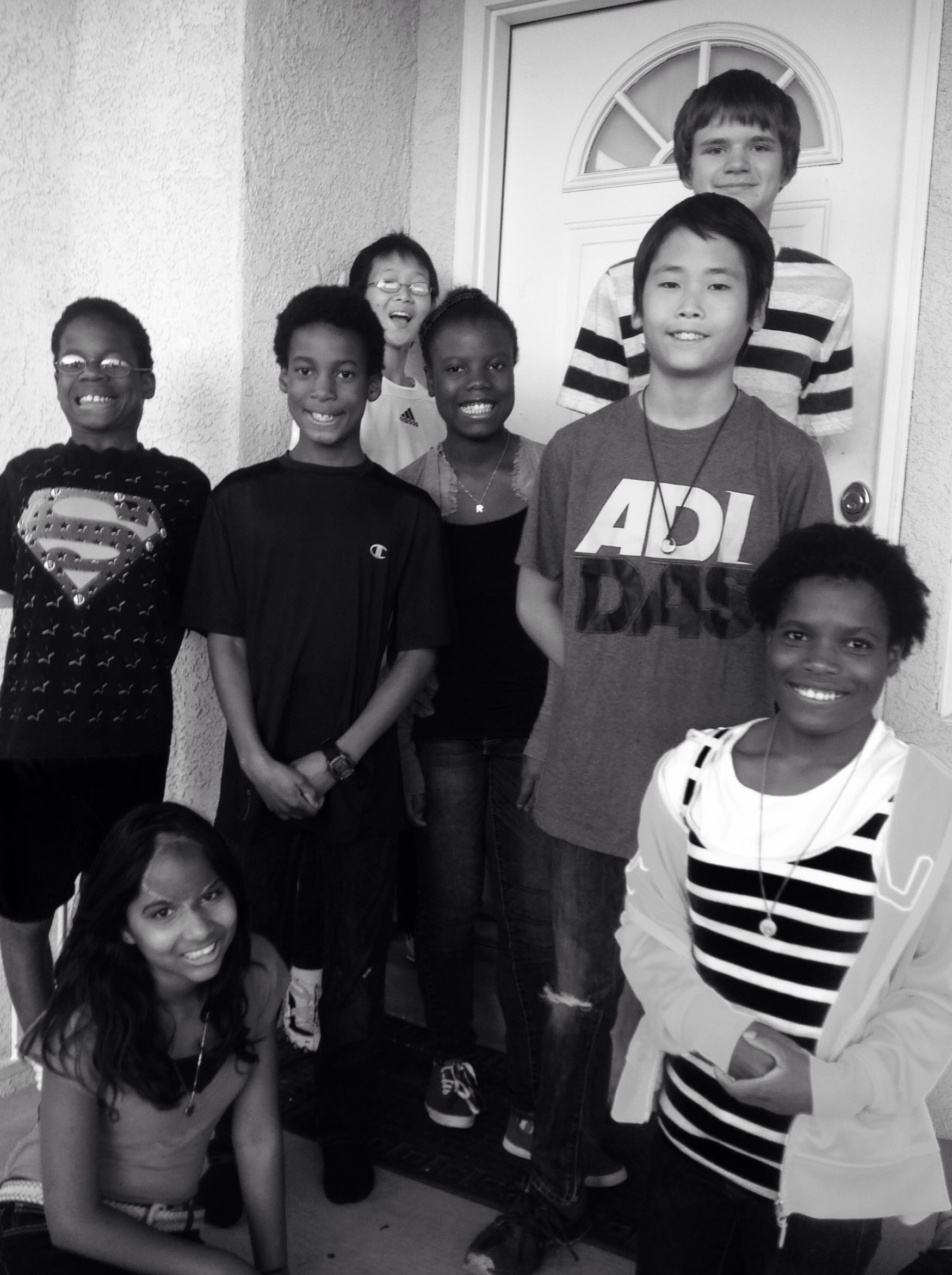To the left a shale slide stretched up the side of the mountain for over a hundred feet. To the right the ground fell away quickly. The shale field continued down the side of the mountain for another hundred feet. And right in the middle was the path. At times it was a generous 2 feet wide. In other places it was a scant eight inches.
And one of us was terrified to step out onto that path.
Last weekend I took a little hike into the beautiful Wasatch Mountains. Our scout troop does it every year. It’s called the “Baldy hike” although we rarely summit Baldy. Here’s a picture.

We head up the canyon to the left of the G. That’s Grove Creek Canyon. We camp in the meadow above the G and then try to summit that peak on the right. That’s Baldy. Then we come down that canyon to the right of the G. That’s Battle Creek Canyon.
Our mountains are made of granite and shale. Granite is one of the hardest rocks. The granite sections are like climbing stairs. Shale is a very weak rock. It breaks easily. It flakes off and shale fields are difficult to cross. Each step needs to be carefully chosen. Step in the wrong spot and you might have the sickening feeling of the mountain moving underneath you.
Grove Creek Canyon has a lot of shale fields. My son was becoming more hesitant the higher we climbed. Finally, it reached a point where he couldn’t go on. Not that he didn’t want to. We were the tail end of our hiking group. Everyone including his brother was well ahead of us. Even those who had started a half hour after us had moved past us and were out of sight along the winding trail that clung perilously to the side of the canyon wall.
Ever been scared of something so badly you can’t move? What did you do? What could I do? Encourage him, sure. I’d been doing that. Berate him? Remind him that everyone else, all his friends made it past this section? I finally decided that no amount of verbal encouragement was going to work. I stepped out beside and reached for his hand.
Come on. We’ll do it together.
Won’t you be too close to the edge?
No, I’m fine. I’ve got plenty of room.
Do I ever lie to my kids? Sometimes, when it’s important. And so we walked hand in hand. We both had full backpacks and that was making it difficult to stand too close together. I stepped very carefully and lightly stepped on the loose dirt and shale at the edge of the trail. About every third step sent a cascade of rocks down the side of the mountain. Each time my son tensed.
Are you okay, Dad?
I’m doing great. No problem.
At times, I was glad he couldn’t see my face.
I’m afraid I’m going to fall.
You won’t fall.
How do you know?
Because I’ll catch you. You’d have to fall past me.
To take his mind off his fears I started talking to him.
Do you know what it means to be brave?
To not be afraid?
Maybe, but everyone is afraid of something. To be brave is to be afraid and do it anyway. Are you afraid to cross these shale slides?
Yeah.
But you’re doing it anyway. Do you know what one of us is being brave?
You are.
Nope. Because I’m not afraid. Remember bravery doesn’t mean you aren’t afraid. It means you are afraid and do it anyway. I’m not afraid to walk on this trail, so I cannot be brave. The one being brave is you.
I’m not sure he believed me. But, it was true. We tend to compare our weakness against other people’s strengths. It was true, that the trail, even walking on the very edge of it as I had to while holding his hand, didn’t scare me. It’s no great feat to do something that doesn’t scare you.
I give lots of speeches. In fact, I enjoy it. My entire family growing up loved the spotlight. My brothers and my mother are all accomplished public speakers. We never met a microphone we didn’t like.
Many people are terrified of public speaking. They look at me and think I’m brave. I’m not. Well, I might be, I hope I am, but not for being willing to speak in public. I’ve seen speakers so terrified they couldn’t breath. But, they spoke anyway. Those people are brave. They are brave in a way that I don’t even understand. I can’t understand it because it’s not my fear.
Never mistake the absense of fear for bravery. And don’t assume that your peers who make something look easy like public speaking or asking questions of senior management, or moving ot a new city, are braver than you.
Because of the two of us struggling up that mountainside, my twelve year old son was the brave one.
Rodney M Bliss is an author, columnist and IT Consultant. His blog updates every weekday at 7:00 AM Mountain Time. He lives in Pleasant Grove, UT with his lovely wife, thirteen children and one grandchild.
Follow him on
Twitter (@rodneymbliss)
Facebook (www.facebook.com/rbliss)
LinkedIn (www.LinkedIn.com/in/rbliss)
or email him at rbliss at msn dot com
(c) 2015 Rodney M Bliss, all rights reserved

My best friend is a brilliant programmer/tester with many years at Microsoft and other high tech companies. He’s one of the only black programmers I’ve ever met.
We need to make sure opportunities exist.
Jay, what value to you think a Technical Account Manager adds to an outage call?
I guess it depends on who is causing the outage, us or the client?
Let’s say the outage is the client’s fault.
Then, the TAM adds no value.
That’s where you’re wrong. The TAM is the most imporant person on the call.
We had an outage at work yesterday. It wasn’t our fault. It was a problem on the client side. That means there is nothing I could do to fix it. So, why was I on the call?
About 5:00pm our help desk supervisor texted me.
Rodney, our queue just went crazy. Can you check with the client and see if anything is happening?
I called my client contact.
Jerry, We are seeing something going on in our point-of-sale line of business.
We’re not seeing anything. Can you provide us with some detail?
After a couple of phone calls back and forth to the help desk supervisor and the client it becomes obvious that something, something big is going very wrong.
Rodney, we are spinning up a major outage bridge. I can’t talk now. Send me an email with the address and account number for one of the systems that your agents are working with.
It’s not unusual for my company to be the first supplier to inform our client of an outage or incident. We set up our own outage bridge call and get all the impacted parties to join our call. That includes account managers, escalation engineers and help desk supervisors at each of our impacted sites.
There is nothing that we can do to fix this issue. It’s completely a client issue. But, I’m the contact with the client. My job is to be the communication bridge that links our two companies together when we are discussing technical issues.
But, Rodney. This wasn’t a technical issue. There was nothing that our IT department could address or help with here.
True, but my role in this case was to communicate. Our client found out about the issue quicker because the help desk supervisor knew to call me. When there were updates from the client on the status, they came to me and I was able to relay that information on the bridge. Without my role, the two sides wouldn’t have been communicating with each other. That is the value I add.
But, it’s not an IT function you are fulfilling.
You’re right. It’s a “help get our systems back up and running no matter the source of the issue” function.
My role is hard to define and easy to overlook. But, in the middle of an outage, I’m the person that people look to for guidance in getting back on track.
Who fills that role in your company? We sometimes call those people “fire fighters,” although a more technical term might be crisis managers. My company has dedicated Incident Managers. These are employees who’s job is to manage an outage. They have the option of pulling any resource from anywhere in the comany to help them address an outage.
I love our Incident Managers, but when I get on a call with them, I’m the one driving. An incident manager is good at identifying resources and bringing them to bear. But our IMs don’t understand my client, and the client architecture. And they lack one additional trait that I have: a sense of ownership of the relationship. I take it as a personal affront when our systems are down. I helped design this system and the processes. If stuff is broken, I figure it’s my responsibility to get it fixed.
I “own” it. And that alone is a pretty big value add
Rodney M Bliss is an author, columnist and IT Consultant. His blog updates every weekday at 7:00 AM Mountain Time. He lives in Pleasant Grove, UT with his lovely wife, thirteen children and one grandchild.
Follow him on
Twitter (@rodneymbliss)
Facebook (www.facebook.com/rbliss)
LinkedIn (www.LinkedIn.com/in/rbliss)
or email him at rbliss at msn dot com(c) 2015 Rodney M Bliss, all rights reserved
On September 11th, 2001 a tragedy occurred in New York City, Washington DC and a field in Pennsylvania. For those of us old enough to remember it, we will never forget where we were, what we were doing. But, what about the ones we think were too young to remember? What impact did that terrible day have on the youngest and most innocent among us?
Last weekend I attended two important events. The second one was on Saturday when I watched my daughter get her degree from Utah State University. I was understandably proud, as many parents are. However, what impacted me more than the graduation was the event the day before. Katrina Dawn Bliss stood up with her brothers in arms, raised her arm to the squared and sword to uphold the Constitution of the United States as a second lieutenant in the United States Army.
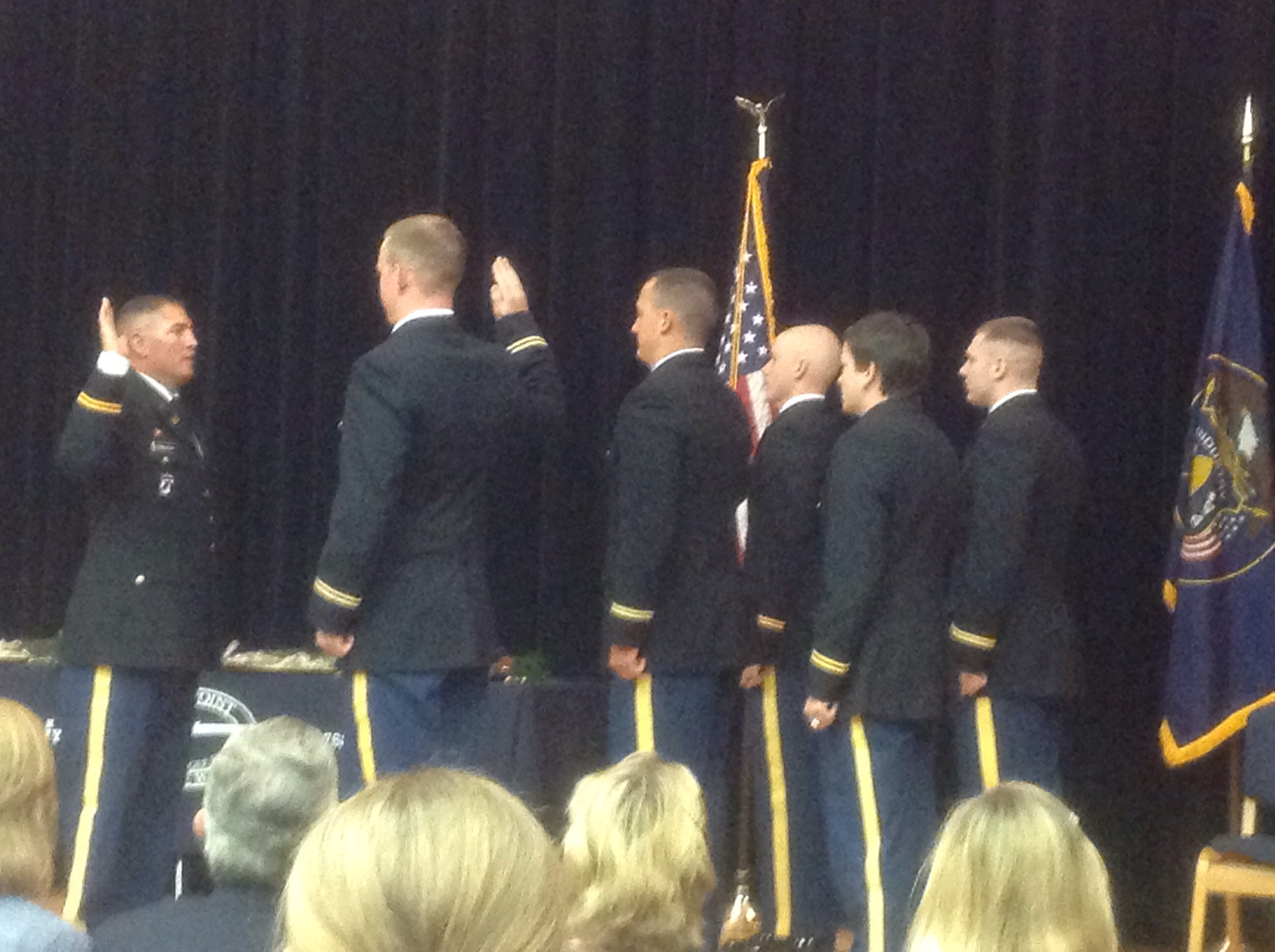
I never had a chance to serve. My dad served, my brother served.
Several years ago, my freshman daughter called from college.
Dad, can I talk to you?
Sure, what’s up?
No. It’s something I need to tell you in person, you and Mom.
We set a time for the following weekend. We tried a couple of questions, but it was obvious that our daughter wasn’t going to share any details until she saw us in person.
What would you think? We were naturally curious, also a little worried. She was a good kid, but parents can come up with any number of senarios when given several days to worry over it. Finally the weekend arrived, and with it our daughter.
Sweety, whatever you have to tell us, we’re fine with it.
Mom, Dad? I joined the army.
Okay. But, what was it you needed to tell us?
I’m not sure why she was so terribly worried about telling us. I’ve always been a huge fan of the military. Whatever the reason, I think she was surprised by our reaction.
She joined the Army Reserves and explained to us that she wanted to become an army veteranarian. I didn’t even know the army had veteranarians.
So, they take care of the horses? Military dogs?
Actually, Dad, they deploy around the world. When the army buys local meat in countries like Iraq and Afghanistan, the veteranarians make sure the meat is healthy. They work with local herdsmen to improve their animal husbandry.
My daughter had obviously been planning this for a long time. But, I didn’t know how long until later.
Have you ever wondered when someone first set foot on the main track of their life? When did they start on the road that led them to be a four star general, or world famous musician, or founder of a software company?
Colin Powell, the former chairman of the joint chiefs of staff, and a four star general described in his autobiography, My American Journey how as a young man, he found his purpose in the ROTC program at a school in Harlem, NY. Billy Joel, the singer/songer explained in an interview how he set his life course while watching The Beatles on the Ed Sullivan show as a child. Bill Gates, founder of Microsoft tells the story of seeing an article in Popular Mechanics for the Altair 1000, one of the first programmable personal computers and how that led directly to the founding of Microsoft..
So, why the military, Katrina?
It was a song.
Which one?
Darryl Worley’s, “Have You Forgotten.”
That’s a song about September 11th.
Yeah, listening to that song I realized I wanted to help defend the country and prevent it ever happening again.
She was nine. The summer after the attacks, when the country had gotten back on our feet and were seriously going after those that had allowed this tragedy to occur, she turned nine and decided what she wanted to do with her life.
Now, 14 years later, she’s accomplished a huge part of that goal.
And I couldn’t be prouder.
When did you start on the path that led you to where you are today?
Rodney M Bliss is an author, columnist and IT Consultant. His blog updates every weekday at 7:00 AM Mountain Time. He lives in Pleasant Grove, UT with his lovely wife, thirteen children and one grandchild.
Follow him on
Twitter (@rodneymbliss)
Facebook (www.facebook.com/rbliss)
LinkedIn (www.LinkedIn.com/in/rbliss)
or email him at rbliss at msn dot com(c) 2015 Rodney M Bliss, all rights reserved
I don’t have TV in my house. Well, I have TVs, of course. I’m not even sure how many I have. I think there are three or four. My kids might have snuck one or two into their rooms. What I don’t have is I don’t have cable TV. I don’t have broadcast TV either. We have plenty of DVDs and a fair number of video tapes still. But, no broadcast television.
I don’t know if Kevin Beggs has TV in his house. Considering he is the president of Lionsgate Television Group, I would imagine he probably does. Beggs was the guy who gave the green light to a small period series called Mad Men. You might have seen an episode or two. It made narrow lapels chic again. It won 4 emmeys for best drama on television.
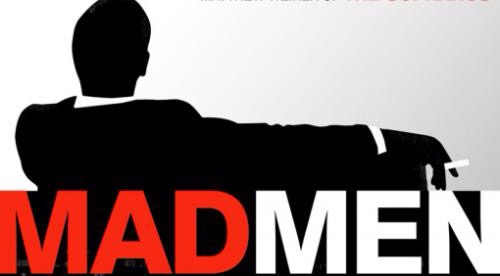
And I never saw a single episode.
And yet, every year when they won, I’d write an email to Beggs. In the email I’d congratulate him on the win and apologize that I’d still never seen a single episode of his series.
How well do you know the people you work with? How important are their goals to you? Do they know that you are interested in them, not just as employees, but as people?
I once bought a manager a bull whip, and for another one I bought him a sword. (The Whip Didn’t Work, But The Sword Was A Hit)
I once bought tiny radio control cars for my team.
I once ordered a set of USB Missile launchers for my team. . including our intern.
Why?
Sometimes people criticize IT teams for playing around too much. I think it’s a matter of understanding your teams, even if what motivates them doesn’t motivate you. I’ve worked places that had pool tables, foosball tables, ping pong tables, XBox games. As a young man I enjoyed playing these various games. It wasn’t until later that I understood why those things were there.
As a manager, I kept those lessons in mind with my own young team. They didn’t understand why they all got 1/10 scale RC cars as a Christmas bonus, or why we held races in the parking lot during work time.
Because, it’s not about what’s important to me. It’s what is important to them that matters.
And that’s why I sent Beggs an email congratulating him on a series I had never seen. Because it wasn’t about what was important to me, it was about what was important to him. See Kevin is a Television guy, he has been since we were friends in high school.
Mad Men is ending it’s 8 year run this month. Kevin reminded me that even though I don’t have TV, there’s Hulu, Netflix, and DVDs.
Rodney, if you haven’t seen an episode of Mad Men, it’s because you choose not to. Don’t blame lack of TV.
I eventually started watching Mad Men. But, it wasn’t on DVD or NetFlix, or Hulu. It was on a tiny screen on the back of the seat in front of me. I’ve been flying back and forth between Salt Lake City and the east coast. On those long flights from Salt Lake to Atlanta, I get to watch selected TV episodes. I’ve now seen quite a few of the escapades of Don Draper and the staff of the Sterling Cooper Draper Pryce ad agency. On my last trip, I realized I’ve travelling maybe just a little too much. . .I’d seen all the available episodes.
When the final episode shows in a couple weeks, I’ll send my friend another email congratulating him on one of the most successful television series in history. And I’ll probably admit that I’ve now seen a few. Because its important to him.
So, when you are looking for a way to motivate your team, don’t think about what you want. Think about what they want.
Rodney M Bliss is an author, columnist and IT Consultant. His blog updates every weekday at 7:00 AM Mountain Time. He lives in Pleasant Grove, UT with his lovely wife, thirteen children and one grandchild.
Follow him on
Twitter (@rodneymbliss)
Facebook (www.facebook.com/rbliss)
LinkedIn (www.LinkedIn.com/in/rbliss)
or email him at rbliss at msn dot com(c) 2015 Rodney M Bliss, all rights reserved
Who would want their mistakes broadcast across the network?
As a writer, I’m grateful to each and every one of you who takes some time out of your day to read my poor electronic scribblings. But, I have a confession to make. I don’t love each of you equally. In fact, there is one reader that is more important than all the rest of you.
Last week I finished up a series of posts collectively described as “Lessons I Learned From My Seven Fathers.” I set the goal this year of doing more multipart themes in this blog. I’ve been thinking about the “Lessons From My Seven Fathers” posts for a long time. These men have been part of my life at various points over the past 50 years. However, even though I had to pick and choose, I only told you half the story. Because while these men were part of my life at various times, there was a constant. The glue that held together what would have otherwise been a completely chaotic childhood and crazy adulthood.
She has provided lessons beyond what the seven men who were part of my life could have ever hoped to teach me. She has certainly been my most important teacher.
What I didn’t stop to think about was that in addition to being my most important teacher she is also my most important reader. Many of you responded to the series I wrote of last week. Many people clicked LIKE in facebook, or on www.staging.rodneymbliss.com.
Last weekend I attended two important ceremonies in Logan, UT. Friday, my lovely wife and I drove for two hours from our home in Pleasant Grove North along I-15 to the Utah State University to watch our daughter receive her commission in the United States Army.
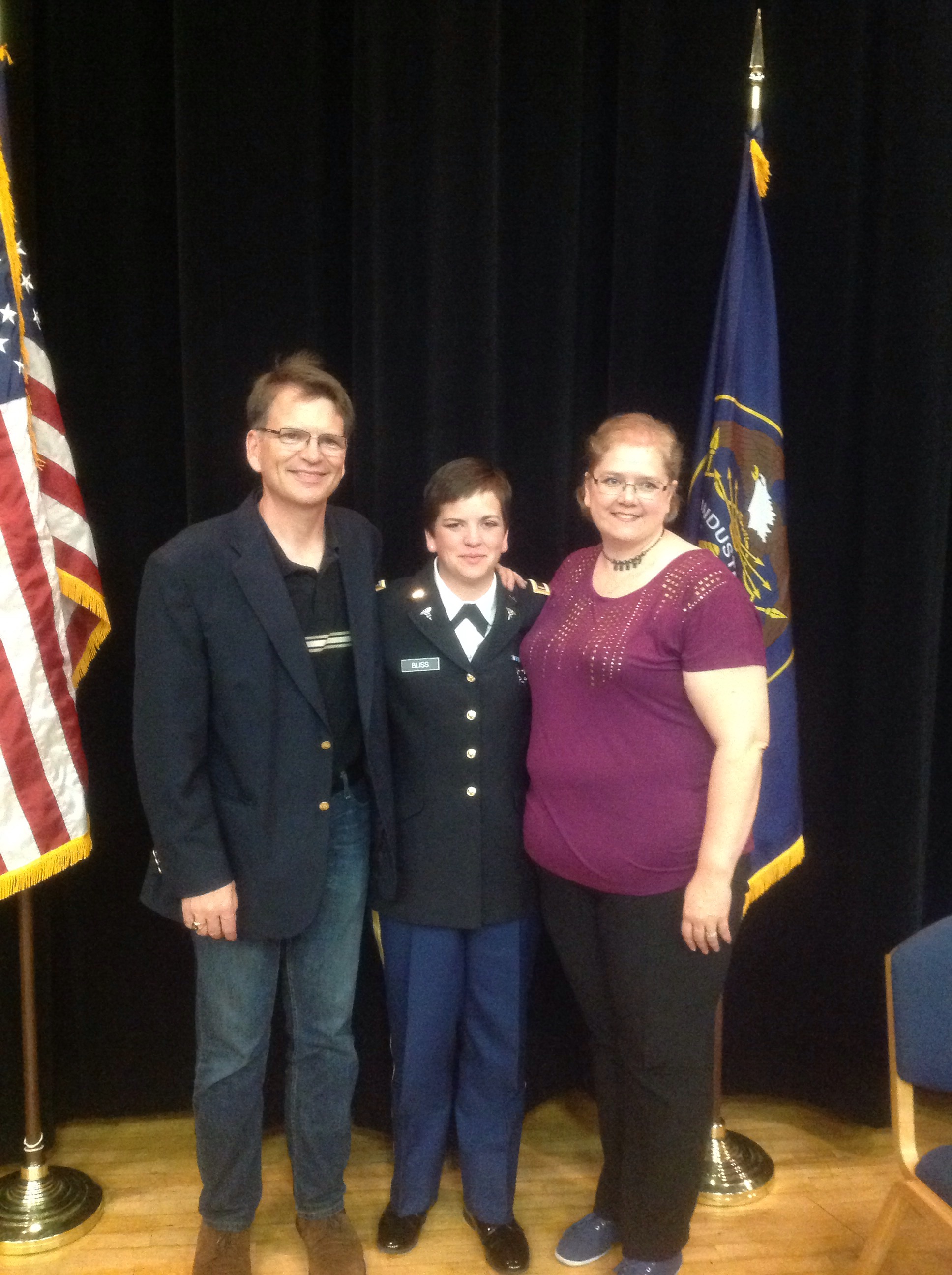
Saturday we drove back, with our kids in tow to watch her walk across the stage and receive a undergraduate degree in vetrenarian science.

My wife and I weren’t the only ones to attend, of course. My daughter’s fiance was there. His father and sister showed up. And my mother and stepfather drove down from Washington. I was reminded again that I’m not simply shouting into the void by writing these words. My mother is a brilliant woman. She built multiple multi-million dollar businesses. She taught at a university. Through trying times she kept herself and her boys together. She was married to my dad for about 30 years.
And I love her dearly.
And I was a bad son.
I don’t mean growing up, although there was some of that, I mean just last week. See, I forgot that my stories, are her stories. And while I might be okay with these stories, it’s not all about me.
So, Mom, I’m sorry.
For the rest of you, let me explain one more business lesson. This one from the most important teacher in my life. She retold this story last weekend and it bears repeating.
Before my mother was a CPA and a Licensed Financial Planner, she worked for the Washington State government. Like all organizations there were great people and those people who were not quite as great. There were salt of the earth types and there were “don’t turn your back on them” types. There came a time where he was approached by a person in authority over her and asked to do something unethical, probably illegal, but certainly unethical.
What would you do?
She was concerned not just for herself, but for her family. If she didn’t go along with the plan, she risked losing everything. And all she had to do to keep her job was look the other way. And to add pressure, everyone else was looking the other way.
She went to my dad to talk about it.
If I don’t do what they are asking me, I’m out. We’ll starve.
No, we won’t starve. The most important thing is for you to do what you think is right. We’ll be fine.
Would you risk your job to do what was right?
She told them that she wasn’t going to be able to look the other way. And just like that, her career in state government was over.
We didn’t starve. In fact, I don’t even remember it being a hard time, although that was a credit to my parents. I’m sure it was a very tough time.
A funny thing happened. Mom went back to school and got an accounting degree. Then, she studied for and passed the CPA exam. Next, she started a CPA firm in our living room. Then, when that company was successfully running and sucking up all her time, she went back and became a licensed financial planner and started an investment firm.
She’s retired now, busy spending her children’s inheritance. She and my stepfather are enjoying the opportunities that they skipped when they were raising families and working. Her hard work and smart choices have given her the opportunity to enjoy her retirement. And the freedom to drive down for her granddaughter’s graduation and commissioning ceremony.
I won’t say that her success was due to refusing to be unethical while working for the state. But, it is true that leaving state government allowed her to pursue options that she otherwise might not have taken advantage. However, even if her life had not been as successful as it turned out, she still would have done the right thing at the state. And that’s the lesson she taught me.
No amount of success is worth it, if it comes at the expense of your integrity.

Thanks, Mom. And thanks for reminding me that my most important teacher is also my most important reader.
(Don’t forget that Mother’s day is May 10. Call your mother.)
Rodney M Bliss is an author, columnist and IT Consultant. His blog updates every weekday at 7:00 AM Mountain Time. He lives in Pleasant Grove, UT with his lovely wife, thirteen children and one grandchild.
Follow him on
Twitter (@rodneymbliss)
Facebook (www.facebook.com/rbliss)
LinkedIn (www.LinkedIn.com/in/rbliss)
or email him at rbliss at msn dot com(c) 2015 Rodney M Bliss, all rights reserved
So, which ones are your real children?
It’s a question that every parent of adopted kids has heard. There’s an equally offensive kids version:
So, do you know anything about your real parents?
My lovely wife and I started the adoption process after our second child was born. It was obvious that my wife wasn’t going to be able to have very many birth kids. I was present for the birth of my three biological kids. After watching just one birth, I realized that if men had to give birth, we’d have one and then quit. There are still permenant scars on my hands where her fingernails dug in.
My lovely wife came from a large family and I came from a mixed up family. (Why I’m Not Sure How Many Siblings I have.) We felt like God had a family larger than three in store for us. We started the adoption process about the same time she became pregnant with our third and final biological child. So, two of my kids are about 3 months apart in age. (The geneologists of the future are going to have fun figuring that one out.)
Ultimately we adopted ten children from all over the world. (India, China, Haiti, USA and Columbia.) My family looks like we adopted. And that prompts the question. Mostly people are not trying to be rude. They are simply clueless on the language of adoption.
Do you know the difference between a program manager and a project manager? How about the definition of change management? Operations vs Engineering?
It folks love to talk in code. Sometimes they do it to intimidate those around them. Sometimes they do it because it’s just easier to use a language that everyone understands. Well, everyone that they talk to. It might occur to them that there are those who don’t understand, but it often doesn’t register that they should explain themeselves.
The language of IT is so specialized that there are complete dictionaries on how to speak to the IT folks.
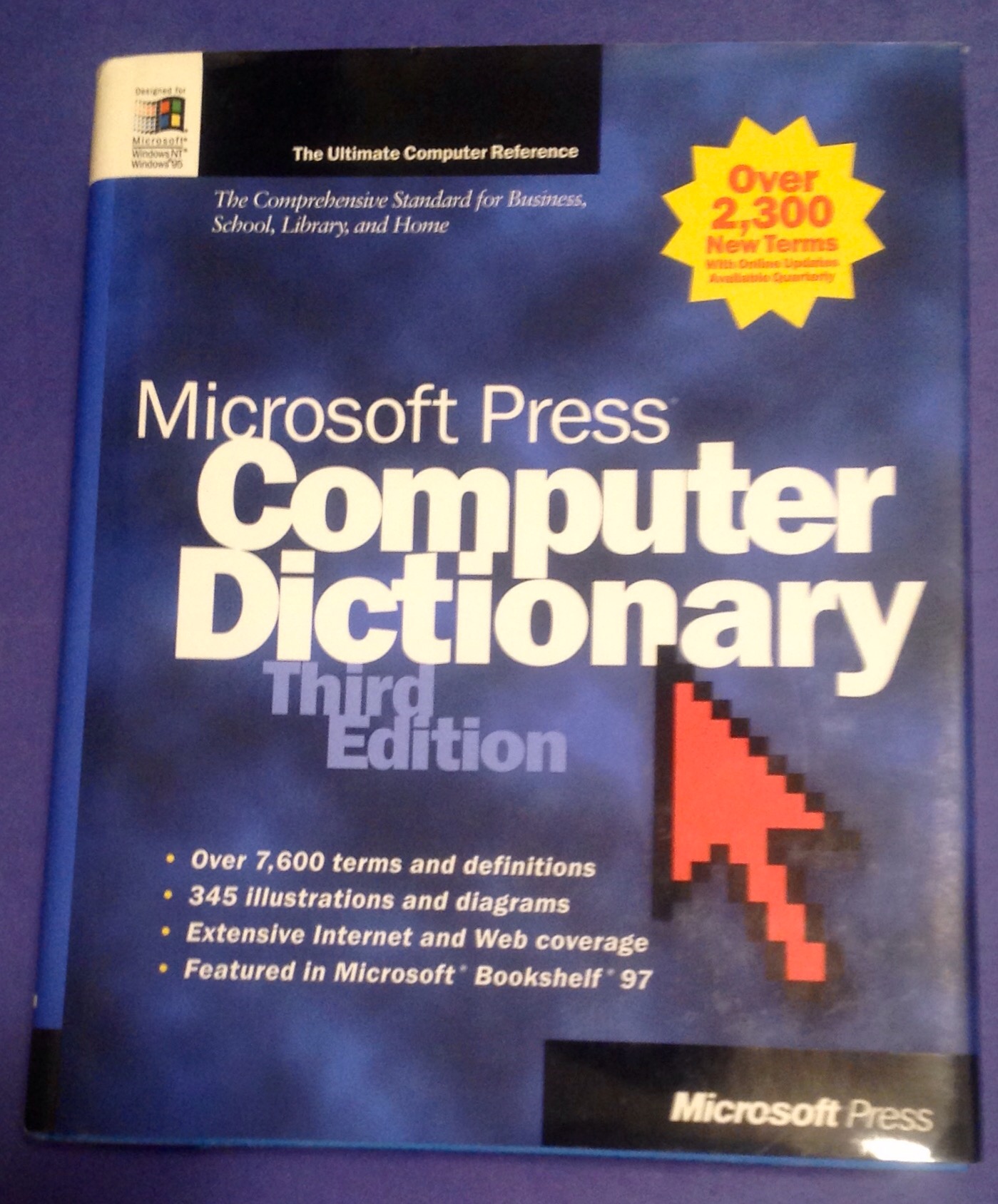
There’s a IT framework called ITIL (Information Technology Infrastructure Library) that is devoted to naming all things IT and descriping what each role is for. For example, it explains that the difference between a program manager and a project manager.
- Project Management: The Project Manager is responsible for planning and coordinating the resources to deply a major release within the predicted cost, time and quality estimates.
- Program Management: Program management is the active process of managing multiple global workstreams or projects which need to meet or exceed business goals according to a pre-determined methodology or life-cycle. Program management focuses on tighter integration, closely knit communications and more control over program resources and priorities.” [IAPPM-2003]
My job title is Technical Account Manager. I’m responible to work with one of our largest accounts and be their connection to the IT department. Typically TAMs, as we are called, do not work directly with our agents on teh production floor. That is the responsibility of Account Managers.
TAMs also don’t much get involved with reviewing contracts. That’s the responsiblity of Client Services.
They also don’t help troubleshoot login issues, that Desktop Engineering.
I do all of these things and more. And it’s because I have adopted children. Remember that question I mentioned at the beginning? “Which ones are your real children?” The question implies a false separation. That somehow some children are more mine than others. It’s semantics. They are kids. My kids. All of them.
I view alot of IT definitions the same way. My role is the link between my client and my services. If I can keep our agents on the phones by helping them get logged in, and I can do it quicker than sending them to the Desktop engineers, it makes sense to just help them. I tend to focus on solutions rather than process.
Here’s the secret, much of the jargon that IT throws at you really doesn’t have to be used. You don’t have to understand the vocabulary to be able to understand the needs, especially customer or client needs. Don’t let them intimidate you.
Oh, and in case you were wondering what my resonse is when someone asks me which are my real children,
All of them. We stopped having imaginary kids when we figured out how to have real ones.
Rodney M Bliss is an author, columnist and IT Consultant. His blog updates every weekday at 7:00 AM Mountain Time. He lives in Pleasant Grove, UT with his lovely wife, thirteen children and one grandchild.
Follow him on
Twitter (@rodneymbliss)
Facebook (www.facebook.com/rbliss)
LinkedIn (www.LinkedIn.com/in/rbliss)
or email him at rbliss at msn dot com(c) 2015 Rodney M Bliss, all rights reserved
(Business Lesson’s From My Mom’s 7th Husband)

(Picture Credit: Wallpapers4u.org)
If you ask my older brother or myself how many siblings we have, we will each tell you that we have two brothers and a sister.
If you ask my younger brother how many siblings he has, he will tell you that he has three brothers and a sister.
If you ask my sister how many siblings she has, she will tell you that she has five brothers.
We are each correct and none of us are exactly right. The truth is I don’t know how many siblings I have. If you count biological, adopted, half and step, I can’t give you an accurate count. I used to know and then my mother started dating again.
I have a challenging job. I’m the glue that links together several departments at my company and ties them to our client. Some days I’m walking our call floor with a radio helping agents get logged in. Other days, I’m meeting with our engineering teams designing our nationwide network and telephony strategy. Still other days I’m meeting with vice presidents explaining our system outages. We recently did a shuffling of the organization chart and I ended up with a new manager. And I keep reminding myself that I don’t know how many siblings I have.
What I mean by that, is that my manager has been with the company a long time, I’ve been here about a year. Many of the processes I’ve put in place over the past year are different than our standard operating processes.
Rodney, why are you on the outage calls? That should really be handled by our Incident Management team.
Why are you collecting the lost agent time due to an outage? That should be the account managers doing that.
Why are you approving maintenance activities? That should be Change Management’s job.
The simple answer to all of these is “Because that’s what works.” I developed processes to solve problems that came up over the past year. Being new to the company I had the luxery, or was stuck with the task of creating some of the solutions from scratch. I looked for what worked. If it didn’t work, I looked for something else. And in the spirit of “If you want it done right, do it yourself” many of my processes require me getting involved.
I’m on the outage calls because I understand our network and our agents better than our Incident Management team. What might take them hours to discover, I can resolve in just a few minutes.
I collect the lost agent minutes, or LAM, because at the end of the month I have to send a report to the client listing all the lost time. It’s easier for me to collect it at the time it happened rather than wait to the end of the month.
I approve maintenance activities because I’m often the only person who understand the ramifications to our various systems that a maintenance activity might impact.
However, there’s a flaw in my plan. and it’s a really big flaw. I can NEVER leave. If I take a day off and we have an outage, the people on the call don’t know how to approach it. If I’m gone for a week, the teams doing maintenance don’t have anyone to provide the “big picture” for the maintenance activities.
You’re probably now asking, “Okay, but what does that have to do with not knowing how many siblings you have? And why don’t you know?”
My mother married my stepfather about three years ago. He is her seventh husband. I wasn’t at the wedding. I’ve met him, of course. He’s been to my house and my kids and I love him. But, I’ve never been to his place in Minnesota. I know he has kids, but I’ve also never met them. And I don’t know how many step-siblings I have. And more importantly, I really don’t care.
In my job, I often don’t know the “normal” way my company does things. I know the way we’ve figured out to service this one client over the past year. Unlike my unknown siblings, I do kind of care how the rest of the company does things. But, only so that I can evaluate if the “standard” way is more efficient than our current way. In cases were it’s not, I really don’t care that everyone else does it differently. I’m confident that the people that I work with know and understand my role and together we can go about the business of serving our customer.
Anyone that prevents me from pursuing that goal is a sibling that I don’t really need.
Rodney M Bliss is an author, columnist and IT Consultant. His blog updates every weekday at 7:00 AM Mountain Time. He lives in Pleasant Grove, UT with his lovely wife, thirteen children and one grandchild.
Follow him on
Twitter (@rodneymbliss)
Facebook (www.facebook.com/rbliss)
LinkedIn (www.LinkedIn.com/in/rbliss)
or email him at rbliss at msn dot com

